By Dar Danielson (Radio Iowa)
Iowa is back in the “Drought Watch” category on the system put together last year to keep tabs on the situation.
DNR Hydrology coordinator, Tim Hall, works with other state agencies in assessing the issue. “We take a number of factors and look at them together. And we decide whether a region of the state is normal, drought watch, drought warning, and drought emergency,” Hall says.
He says the drought watch is similar to a thunderstorm or tornado watch. “Which is really just a call for people to be very careful and pay attention. Because things are looking on the dry side,” he says, “and right now they’re getting a little bit worse all the time. So we’re just trying to keep an eye out and work with folks to make sure everybody has the information they need.” Hall says the state is also seeing the start of what could be a “flash drought,” or a rapid increase in drought conditions in some areas.
“Particularly in the eastern part of the state where things just got really dry really fast. We saw the U-S Drought Monitor pop up with severe drought in parts of northeast Iowa and southeast Iowa. So you know, we were kind of on the mend there for a while and then March and particularly April and May have just turned dry on us and they have not done us any favors,” Hall says. He says there are some indications the conditions might change and bring more rain, and June is normally the wettest month in the state. Hall says until we see more rain, everyone should do what they can to stop wasting water by fixing any leaky fixtures.
“Which is about as pure and simple wasting water as you can get. If you’re just dribbling it down the drain, you’re using resources to pump the water, to treat the water to get it to your house. And if you’re just letting it go down the drain, that’s an absolute waste of resources,” Hall says. “So figure out how to get those leaking faucets fixed and leaking toilets fixed.”
Hall says the situation may soon call for other measures as well. “Unfortunately, it looks like we’re getting into a situation where we’re going to have to start to remind people that water conservation is a necessary thing,” he says. “And we’re going to have to try to work on that a little bit in the state as we get through these dry, these dry weeks here.” Hall says the best case scenario would be for normal June rainfall to return and turn the drought conditions around. But he says we have to be prepared if that does not happen.




